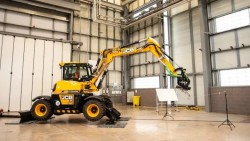A trial will test to see whether a JCB excavator installed with sensing technology can accurately install prefabricated construction sub-assemblies.
The Construction Innovation Hub (CIH) government-backed Big Yellow Robots project is running tests at the Manufacturing Technology Centre (MTC) in Coventry. In order to make the most of modern methods of construction, a new generation of equipment to assemble and install offsite manufactured components needs to be developed.
The CIH acquired a JCB Hydradig wheeled excavator for the project, with JCB providing engineering support, back-up and a skilled demonstration operator. With sensing technology attached to the machine and direct access to the Hydradig's CAN system that controls the hydraulic valves, the team is able to accurately map every movement. In addition, an array of cameras within the test cell is focussed on reflective points on the boom and dipper, to follow the machine in real time.
The Hydradig, which is equipped with a two-piece main boom and a tilt/rotator, is undertaking a range of repetitive operations. These include lifting and placing actual glazing components, using a pen mounted on the tilt/rotator to write on two white boards within the test cell, and running a range of circular attachments along an inclined string without touching it.
"As part of the Construction Innovation Hub's transformative programme, we are looking at a range of technologies to help the assembly of offsite components," said Mark Ireland, chief engineer of technology strategy at the MTC. "That could be through robotising construction equipment, or ensuring robots can work in a construction environment. Our ultimate goal is to apply kinematic modelling to construction machinery."
Manufacturing robots use kinematic modelling and cartesian grids (three-dimensional x, y and z coordinates) to accurately repeat complex movements. To achieve similar activities with an excavator, a skilled operator would need to be able to combine main boom, dipper arm, bucket ram and a tilt/rotator in an accurate, repeatable manner. The project is focussed on linearity and speed, to enable a non-skilled operator to work as efficiently as a highly skilled machine driver.
While robots cope well with repeatable tasks in a non-changing environment, such as a factory, they can struggle to deal with the many variables of site work and that is where the operator will be required. The Big Yellow Robots project is working to refine what it calls 'last metre automation' where accuracy and repeatability are vital.









